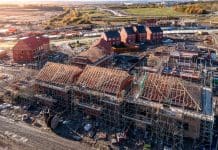Industry professionals familiar with CIBSE and its publications will immediately recognise that the recently published Building Performance Reimagined report represents a significant departure from CIBSE’s norm
Unlike CIBSE technical documents, which provide guidance on system sizing, maintenance, controls, net zero or embodied carbon, this new publication explores entirely new horizons for CIBSE and its members, emphasising a future-oriented perspective on building performance that extends beyond energy and carbon considerations.
As engineers, envisioning future scenarios can often be a daunting task. This report addresses this challenge head-on by describing a variety of future scenarios, changes and areas where engineers could exert considerable influence. The report’s beautifully designed images and infographics effectively convey several key messages.
A fundamental shift in engineering focus
We are on the brink of profound social, technical, economic and environmental changes. These include the impacts of climate change, digital transformation, the rise of artificial intelligence (AI), the decline of biodiversity, population growth and the increasing scarcity of resources.
These impending changes necessitate a fundamental shift in our engineering focus, expanding the current narrow emphasis on energy and carbon to a broader consideration of health and resilience.
This means prioritising the wellbeing of all occupants – human and non-human – and ensuring the resilience of the built environment, including the buildings and the infrastructure on which they rely and with which they interact.
These sweeping changes also introduce new, complex problems that require a diverse set of skills and expertise to solve.
A holistic approach to the built environment
Engineers must engage with other disciplines to ensure a holistic approach to the built environment. This includes collaborating with experts in digital technologies, AI, user experience, ecology and social sciences.
Even within the engineering field, fostering collaboration from concept to completion and beyond, rather than adhering to the current linear process, would represent a significant step forward.
The report emphasises the evolving role of building services engineers, who are now tasked with responsibilities far beyond ensuring the basic function and energy efficiency of a building.
They must also consider the wellbeing of occupants – focusing on air quality, acoustics, thermal comfort, lighting, mental and physical health and stimulation. Furthermore, they are responsible for promoting biodiversity, as well as social equity and diversity.
Additionally, the responsibilities of building services engineers extend beyond individual buildings to encompass entire neighbourhoods and cities. They influence how buildings connect to local and city infrastructures and how they interact with people, businesses, biodiversity and local resources.
This expanded role underscores the importance of viewing building performance through a wider lens that includes environmental, social and economic factors.
To effectively address these wider responsibilities, the industry must develop a common language of values that reflect the new building performance metrics highlighted in the report.
This unified language will enhance communication with clients, enabling them to make decisions that extend beyond cost and regulatory compliance. By doing so, engineers can help clients understand the broader impacts of their decisions, leading to more sustainable and resilient outcomes.
Thinking beyond traditional boundaries
Building services engineers possess the diverse skills and expertise necessary to influence the performance of the built environment. They are well-positioned to lead the industry in adopting more holistic performance metrics and values.
However, to fully realise this potential, engineers must be willing to ask the right questions and remain curious about all aspects of buildings, their lifecycle and their occupants. This curiosity will drive innovation and lead to the development of solutions that are both sustainable and resilient.
In conclusion, CIBSE’s Building Performance Reimagined project challenges engineers to think beyond traditional boundaries and consider the broader implications of their work.
By embracing a holistic approach that prioritises health and resilience, engineers can help shape a built environment that is better equipped to face future challenges.
This forward-thinking perspective not only benefits individual buildings and their occupants but also contributes to the overall wellbeing of neighbourhoods, communities and cities. As an industry, we must rise to this challenge and lead the way toward a more sustainable and resilient future.
The Building Performance Reimagined report can be downloaded for free at https://www.cibse.org/policyinsight/key-policy-areas/building-performancereimagined














